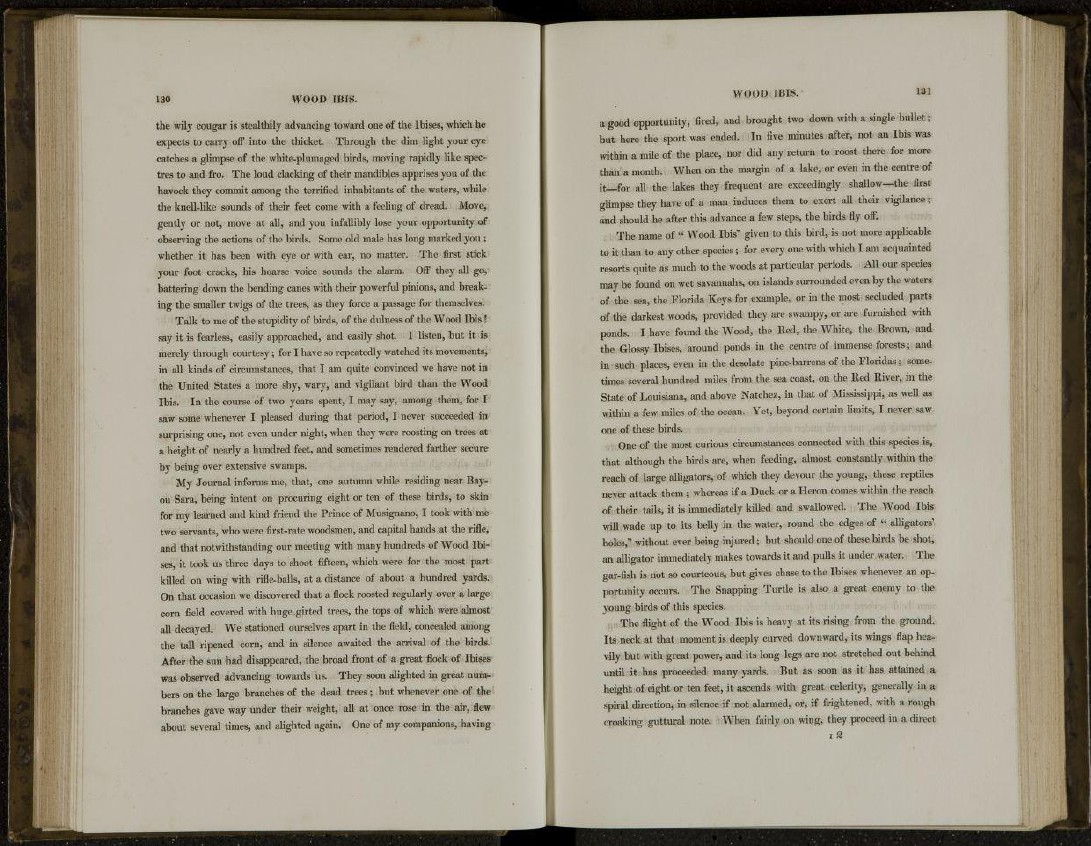
the wily cougar is stealthily advancing toward one of the Ibises, which he
expects to carry off into the thicket. Through the dim light your eye
catches a glimpse of the white-plumaged birds, moving rapidly like spectres
to and fro. The loud clacking of their mandibles apprises you of the
havock they commit among the terrified inhabitants of the waters, while
the knell-like sounds of their feet come with a feeling of dread. Move,
gently or not, move at all, and you infallibly lose your opportunity of
observing the actions of the birds. Some old male has long marked you ;
whether it has been with eye or with ear, no matter. The first stick
your foot cracks, his hoarse voice sounds the alarm. Off they all go,
battering down the bending canes with their powerful pinions, and breaking
the smaller twigs of the trees, as they force a passage for themselves.
Talk to me of the stupidity of birds, of the dulness of the Wood Ibis I
say it is fearless, easily approached, and easily shot. I listen, but it is
merely through courtesy; for I have so repeatedly watched its movements,
in all kinds of circumstances, that I am quite convinced we have not in
the United States a more shy, wary, and vigilant bird than the Wood
Ibis. In the course of two years spent, I may say, among them, for I
saw some whenever I pleased during that period, I never succeeded in
surprising one, not even under night, when they were roosting on trees at
a height of nearly a hundred feet, and sometimes rendered farther secure
by being over extensive swamps.
My Journal informs me, that, one autumn while residing near Bayou
Sara, being intent on procuring eight or ten of these birds, to skin
for my learned and kind friend the Prince of Musignano, I took with me
two servants, who were first-rate woodsmen, and capital hands at the rifle,
and that notwithstanding our meeting with many hundreds of Wood Ibises,
it took us three days to shoot fifteen, which were for the most part
killed on wing with rifle-balls, at a distance of about a hundred yards.
On that occasion we discovered that a flock roosted regularly over a large
corn field covered with huge .girted trees, the tops of which were almost
all decayed. We stationed ourselves apart in the field, concealed among
the tall ripened corn, and in silence awaited the arrival of the birds.
After the sun had disappeared, the broad front of a great flock of Ibises
was observed advancing towards us. They soon alighted in great numbers
on the large branches of the dead trees; but whenever one of the
branches gave way under their weight, all at once rose in the air, flew
about several times, and alighted again. One of my companions, having
W O O D I B I S. 131
a good opportunity, fired, and brought two down with a single bullet;
but here the sport was ended. In five minutes after, not an Ibis was
within a mile of the place, nor did any return to roost there for more
than a month. When on the margin of a lake, or even in the centre of
it—for all the lakes they frequent are exceedingly shallow—the first
glimpse they have of a man induces them to exert all their vigilance;
and should he after this advance a few steps, the birds fly off.
The name of " Wood Ibis*" given to this bird, is not more applicable
to it than to any other species; for every one with which I am acquainted
resorts quite as much to the woods at particular periods. All our species
may be found on wet savannahs, on islands surrounded even by the waters
of the sea, the Florida Keys for example, or in the most secluded parts
of the darkest woods, provided they are swampy, or are furnished with
ponds. I have found the Wood, the Red, the White, the Brown, and
the Glossy Ibises, around ponds in the centre of immense forests; and
in such places, even in the desolate pine-barrens of the Floridas; sometimes
several hundred miles from the sea coast, on the Red River, in the
State of Louisiana, and above Natchez, in that of Mississippi, as well as
within a few miles of the ocean. Yet, beyond certain limits, I never saw
one of these birds.
One of the most curious circumstances connected with this species is,
that although the birds are, when feeding, almost constantly within the
reach of large alligators, of which they devour the young, these reptiles
never attack them ; whereas if a Duck or a Heron comes within the reach
of their tails, it is immediately killed and swallowed. The Wood Ibis
will wade up to its belly in the water, round the edges of " alligators'
holes," without ever being injured; but should one of these birds be shot,
an alligator immediately makes towards it and pulls it under water. The
gar-fish is not so courteous, but gives chase to the Ibises whenever an opportunity
occurs. The Snapping Turtle is also a great enemy to the
young birds of this species.
The flight of the Wood Ibis is heavy at its rising from the ground.
Its neck at that moment is deeply curved downward, its wings flap heavily
but with great power, and its long legs are not stretched out behind
until it has proceeded many yards. But as soon as it has attained a
height of eight or ten feet, it ascends with great celerity, generally in a
spiral direction, in silence if not alarmed, or, if frightened, with a rough
croaking guttural note. When fairly on wing, they proceed in a direct
i 2